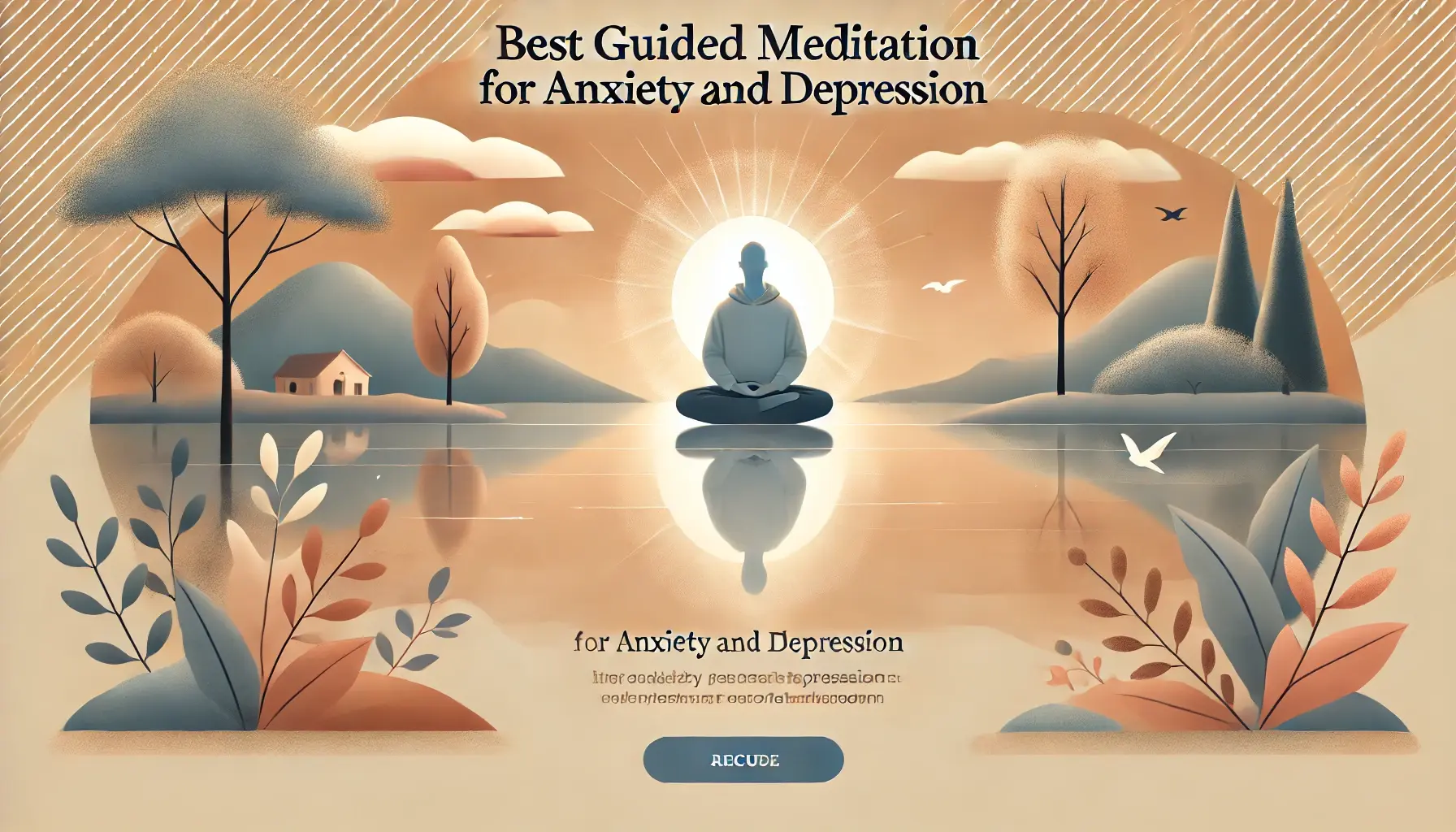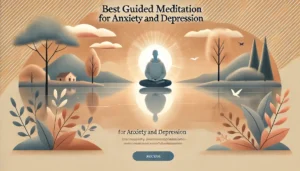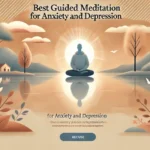Guided meditation can be a powerful tool for easing anxiety and depression, helping to calm the mind and bring a sense of peace. This form of meditation involves listening to a gentle voice guiding you through relaxation exercises, visualizations, or positive affirmations. It’s especially helpful for those struggling to quiet their thoughts, as the voice provides a focus point, making it easier to stay engaged and relaxed.Best Guided Meditation For Anxiety And Depression
In a typical session, you may be guided to focus on your breath, release tension from each part of your body, and visualize calming scenes like a beach or forest. These techniques activate the body’s relaxation response, reducing stress hormones and calming racing thoughts. Regular practice can gradually help reduce symptoms of anxiety and depression, providing tools to manage emotions and cultivate a sense of inner balance.Best Guided Meditation For Anxiety And Depression
Whether you’re new to meditation or experienced, guided meditation offers a simple way to reduce stress and improve mental well-being. Sessions can be as short as five minutes or as long as an hour, making them flexible to fit into any schedule. Try setting aside a quiet time each day to listen, allowing yourself to relax and recharge.
Read More About Us GuidedMeditation
Top 10 Guided Meditations to Alleviate Anxiety and Depression
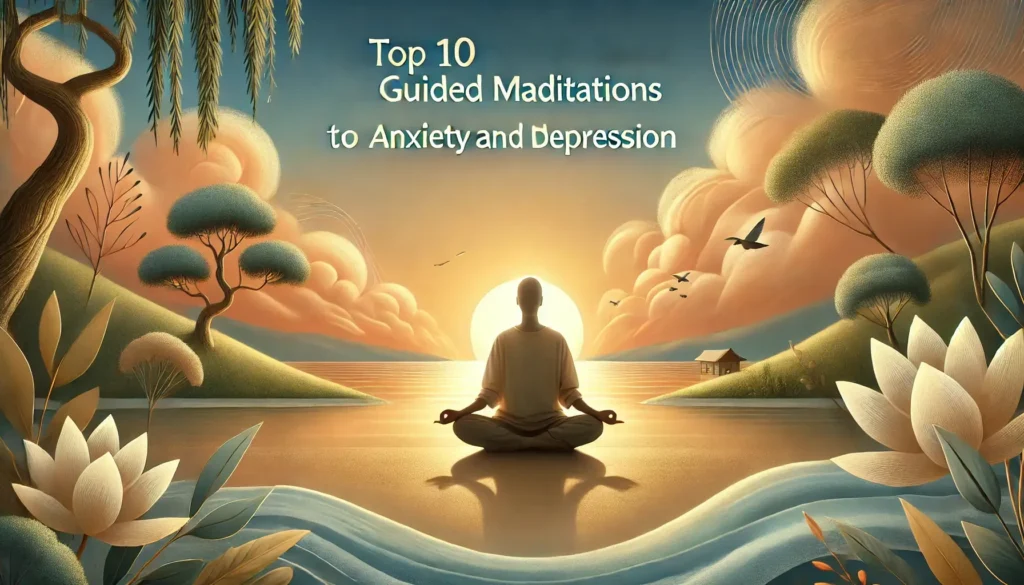
Guided meditation can be a soothing and effective way to ease anxiety and depression. Listening to someone guide you through relaxing exercises and calming thoughts helps you focus, relax, and let go of stress. Here are the top 10 guided meditations to help you find peace and lift your mood:Best Guided Meditation For Anxiety And Depression
- Calm’s “7 Days of Calm” – This beginner-friendly series offers short, daily meditations to build calmness and confidence.
- Headspace’s “Managing Anxiety” Course – This guided series focuses on mindful breathing and relaxation to reduce anxiety over time.
- Insight Timer’s “Healing Through Self-Compassion” – This meditation encourages self-kindness and acceptance, relieving feelings of sadness or worry.
- UCLA’s “Breath, Sound, Body” – A simple meditation that uses breathing and body awareness to help you feel present and peaceful.
- The Honest Guys’ “Guided Meditation for Deep Relaxation” – A calming meditation that guides you through relaxing each part of your body.
- Mindful Movement’s “Let Go of Stress” – This guided meditation helps you release stress and find a sense of relief.
- Breethe’s “Calming Meditation for Anxiety” – A short, soothing session for when anxiety feels overwhelming.
- Tara Brach’s “Radical Acceptance” – A guided meditation focusing on self-acceptance and inner peace.
- Yoga Nidra by Swami Jnaneshvara – Deep relaxation meditation that leads to restful sleep and calm.
- Smiling Mind’s “Mindful Foundations” – A beginner-friendly meditation series focusing on basic mindfulness skills to reduce stress.
Each of these meditations offers unique benefits, helping you feel more relaxed, focused, and positive. Try different ones to find what brings you the most relief and comfort.Best Guided Meditation For Anxiety And Depression
How Guided Meditation Can Help Manage Anxiety and Depression
Guided meditation is a helpful way to manage anxiety and depression by calming the mind and reducing stress. In guided meditation, you listen to a gentle voice that leads you through relaxation exercises, breathing techniques, and positive thinking. This guidance helps keep you focused, making it easier to relax, even if your mind tends to wander.Best Guided Meditation For Anxiety And Depression
For anxiety, guided meditation can reduce the racing thoughts and worry that often make you feel tense. By focusing on deep breathing and calm visualizations, it helps bring your mind to the present moment, reducing feelings of fear and unease.
For depression, guided meditation can shift your focus to positive thoughts and self-compassion. It encourages you to feel at ease, improving mood and emotional balance. With regular practice, guided meditation can gradually help you respond more calmly to stress and feel more positive each day.Best Guided Meditation For Anxiety And Depression
Guided meditation sessions can be as short as a few minutes or longer, fitting easily into any schedule. Practicing regularly can make a real difference, helping you feel more relaxed and better able to handle challenges. It’s a gentle, accessible tool that supports mental health and can be used anytime, anywhere.Best Guided Meditation For Anxiety And Depression
Best Free Guided Meditation Apps for Anxiety and Depression
If you’re dealing with anxiety or depression, free guided meditation apps can be a great way to find relief. These apps offer guided sessions that help calm your mind and improve your mood. Here are some of the best free apps for managing anxiety and depression:
- Calm – Known for its peaceful music and nature sounds, Calm offers free guided sessions for stress relief, including a “7 Days of Calm” series to help beginners get started.
- Headspace – This app is popular for its simple, easy-to-follow meditations. Headspace offers free sessions for managing anxiety, focusing on mindful breathing and relaxation.
- Insight Timer – This app has a huge library of free guided meditations, including ones focused on reducing stress, easing anxiety, and promoting self-love.
- UCLA Mindful – Created by UCLA, this app offers basic mindfulness exercises that are easy to follow and great for beginners.
- Smiling Mind – A great choice for people of all ages, Smiling Mind offers free meditation programs to help improve mental health and well-being.
- MyLife Meditation – This app checks in with how you’re feeling and suggests guided sessions to match your mood, making it a personalized option for stress and anxiety relief.Best Guided Meditation For Anxiety And Depression
Each of these apps offers free tools to help you relax, breathe, and feel better. They’re easy to use and great for finding a sense of peace anytime you need it.Best Guided Meditation For Anxiety And Depression
Mindfulness-Based Stress Reduction (MBSR): A Path to Mental Well-being

Mindfulness-Based Stress Reduction (MBSR) is a program designed to improve mental well-being by teaching people how to focus on the present moment. Developed by Dr. Jon Kabat-Zinn, MBSR combines mindfulness meditation and gentle movements to help people manage stress, anxiety, and depression.
The main idea of MBSR is to be more aware of your thoughts, emotions, and body sensations without judgment. By learning to notice and accept these feelings, you can better handle stress and feel more at ease.
In MBSR, you practice different techniques like deep breathing, body scanning, and mindful movement, such as gentle yoga. These exercises help calm the mind and reduce stress. The program often includes group sessions, where people share their experiences and support each other.
MBSR has been shown to reduce symptoms of stress, improve focus, and boost overall mood. Many people find that regular practice of mindfulness can make a big difference in how they respond to daily challenges. MBSR is a powerful tool for anyone looking to improve their mental well-being and live a more peaceful life.Best Guided Meditation For Anxiety And DepressionBest Guided Meditation For Anxiety And Depression
Guided Meditation Scripts for Overcoming Anxiety and Depression
Guided meditation scripts are written words that guide you through a relaxing meditation to help reduce anxiety and depression. These scripts focus on calming the mind, helping you let go of negative thoughts, and finding peace within yourself. They’re like a gentle voice guiding you through each step, making it easier to relax.Best Guided Meditation For Anxiety And Depression
In a typical script for anxiety, you might be guided to take deep breaths, release tension in your body, and focus on positive thoughts. This can help slow down racing thoughts and bring a sense of calm. For depression, scripts often include words of self-compassion and encouragement, helping you feel more at ease and hopeful.Best Guided Meditation For Anxiety And Depression
The Role of Guided Meditation in Cognitive Behavioral Therapy for Depression
Guided meditation scripts can be short or long, so you can choose what fits your mood and time. You can read them yourself, listen to someone read them, or even record your voice to play back later. By using these scripts regularly, you may find it easier to manage difficult emotions and feel more balanced and positive. They are simple tools anyone can use to improve mental well-being.
Guided meditation can play a helpful role in Cognitive Behavioral Therapy (CBT) for treating depression. CBT is a type of therapy that helps people change negative thought patterns and behaviors. Guided meditation supports this process by helping people calm their minds, focus on the present, and become more aware of their thoughts without judgment.
In guided meditation, a soothing voice leads you through exercises that encourage relaxation and positive thinking. This helps ease feelings of sadness, worry, or low self-esteem, which are common in depression. By learning to observe thoughts rather than react to them, you can develop a sense of control and distance from negative thoughts.
When used alongside CBT, guided meditation can make therapy more effective. It strengthens the mind’s ability to stay calm and focused, helping people manage stress and anxiety better. Regular practice can also improve mood, making it easier to handle daily challenges.Best Guided Meditation For Anxiety And Depression
Together, CBT and guided meditation offer a balanced approach to managing depression, helping people feel more grounded, positive, and in control of their mental health.
The Science Behind Guided Meditation: How It Affects the Brain
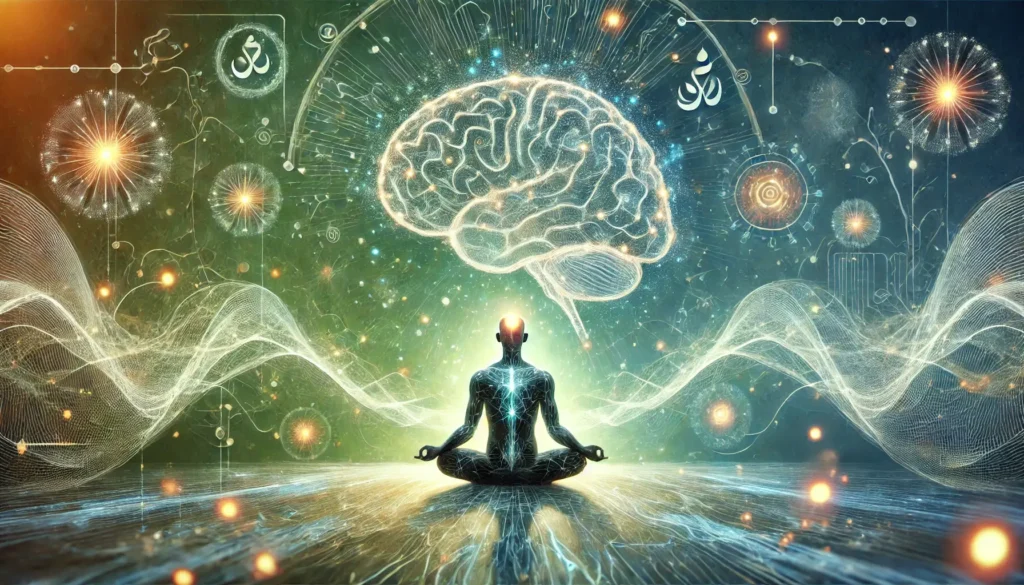
Guided meditation affects the brain in ways that help reduce stress, anxiety, and even feelings of sadness. When you meditate, especially with a guide, your brain slows down, focusing on calming words, breathing, and relaxation. This process changes the way your brain works, leading to a sense of peace.
One big change happens in the amygdala, the part of the brain that handles fear and stress. Meditation helps calm the amygdala, making you feel less anxious. Another part of the brain, the prefrontal cortex, which manages thoughts, decision-making, and focus, becomes more active and helps you feel clearer and more in control.
Guided meditation also boosts serotonin and dopamine, brain chemicals that improve mood and promote feelings of happiness. At the same time, it reduces stress hormones, helping your body relax. Regular practice strengthens these positive effects, making it easier to handle stressful situations.
In simple terms, guided meditation trains the brain to stay calm, positive, and focused. This makes it a powerful tool for managing emotions and improving mental well-being.Best Guided Meditation For Anxiety And Depression
Tips and strategies for developing a consistent meditation practice tailored to individual needs.
Building a regular meditation practice that suits your personal needs can bring calm and balance to your life. Here are some simple tips and strategies to help you develop a routine that works for you:Best Guided Meditation For Anxiety And Depression
- Start Small – Begin with just a few minutes each day. You don’t need to meditate for long to feel the benefits; even 5–10 minutes can make a difference.
- Pick a Time – Choose a time that feels natural, like early morning or before bedtime. Sticking to the same time every day can help make meditation a habit.
- Find Your Space – Pick a quiet, comfortable spot where you feel relaxed. This could be a cozy corner, a soft chair, or even a cushion on the floor.
- Use Guided Meditations – If you’re new to meditation, try using guided audio or video sessions. They’ll help you stay focused and make it easier to relax.
- Choose a Focus – Tailor your practice to your needs. For stress, try breathing exercises; for positivity, focus on gratitude; and for calm, try body relaxation techniques.
- Be Flexible – Life is busy, so don’t worry if you miss a day or need to adjust your schedule. Meditation is about helping you feel better, not about being perfect.
- Celebrate Progress – Notice any small improvements, like feeling more relaxed or less stressed. Recognizing the benefits can help you stay motivated.
With patience and practice, you can create a meditation routine that fits your lifestyle, helping you feel balanced and at peace every day.Best Guided Meditation For Anxiety And Depression
Conclusion
The best guided meditation for anxiety and depression is one that resonates personally with you, helping you feel calm, focused, and uplifted. Whether it’s a short breathing exercise, a visualization for relaxation, or a session that emphasizes positive thinking, guided meditation offers powerful support in managing stress and improving mood. By practicing regularly, you can build a sense of peace and resilience, equipping yourself with tools to face life’s challenges more calmly and confidently. Guided meditation is accessible to everyone, making it a simple yet effective path to better mental health and emotional balance.Best Guided Meditation For Anxiety And Depression
Read More About Us GuidedMeditation
FAQs
What is guided meditation?
Guided meditation involves listening to a narrator who leads you through relaxation techniques, visualizations, or mindfulness exercises to promote mental well-being.
How can guided meditation help with anxiety and depression?
Regular practice of guided meditation can reduce stress, calm the mind, and improve mood by encouraging relaxation and positive thinking.
How often should I practice guided meditation to see benefits?
Starting with daily sessions of 5–10 minutes can be effective. Consistency is key; over time, you may increase the duration as it fits your schedule.
Are there free resources available for guided meditation?
Yes, several free apps and online platforms offer guided meditations, such as Insight Timer, UCLA Mindful, and Smiling Mind.Best Guided Meditation For Anxiety And Depression
